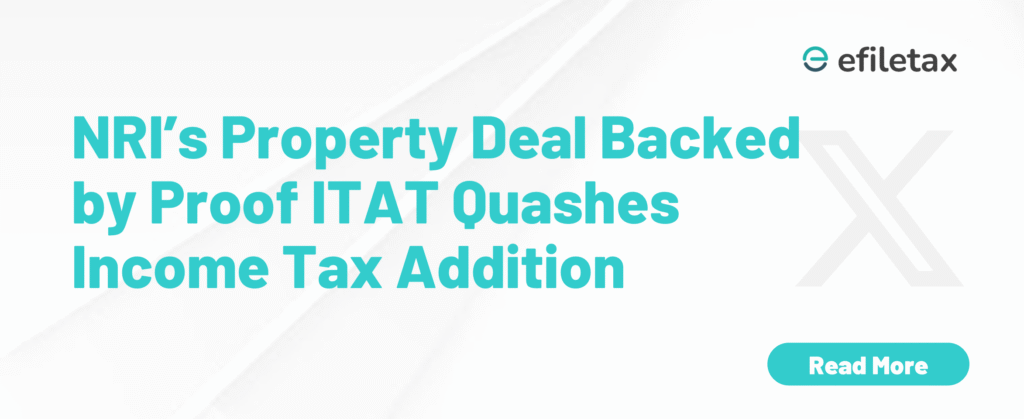
NRI Property Investment: ITAT Ruling Simplifies Tax Jurisdiction Rules
In a recent ITAT (Income Tax Appellate Tribunal) case, the addition made by the Assessing Officer (AO) was quashed due to jurisdictional lapses and improper reliance on bank statements and unsigned sale agreements.
Let’s break this down for Indian taxpayers, NRIs, and consultants.
The Case at a Glance
- Tribunal: ITAT Delhi Bench
- Case Reference: ITAT Order
- Assessment Year: 2011–12
- Assessee: A Non-Resident Indian (NRI)
- Nature of Investment: Property purchase in India
- Disputed Issue: Addition under Section 69 for unexplained investment
What Triggered the Tax Addition?
The AO made an addition of ₹28.5 lakh under Section 69 (unexplained investment) based on:
- A bank statement where ₹28.5 lakh was allegedly deposited.
- An unsigned agreement to sell supposedly related to property investment.
- A statement recorded under Section 131 from a third party.
Why the ITAT Quashed the Addition
1. Lack of Proper Jurisdiction
- The AO had no legal jurisdiction over the NRI assessee.
2. Invalid Documentary Evidence
- The agreement had no signatures—not legally enforceable.
- No independent inquiry or cross-verification was done.
3. Violation of Natural Justice
- The assessee was not given an opportunity to cross-examine the third-party statement used against them.
➡️ Result: ITAT ruled that the entire addition was legally unsustainable.
What Section 69 Says (In Simple Terms)
Under Section 69 of the Income-tax Act, if the taxpayer fails to explain the source of any investment
But this applies only if:
- The evidence is credible and linked to the taxpayer.
Expert View: NRI Taxation Needs Sensitive Handling
“Assessments involving NRIs must be supported by clear jurisdiction and documented proof. A mere name match or one-sided bank detail is not sufficient for taxation.”
— Amit Agarwal, CA & Tax Expert
Key Learnings for NRIs & Tax Professionals
✅ Always check jurisdiction: A notice without proper jurisdiction is invalid.
✅ Document everything: Ensure sale agreements are signed and bank entries are traceable.
Related Blog:
👉 How NRIs Can File ITR in India Without Physical Visit
FAQ – NRI Property Investment & Tax
Q1: Can bank transactions alone trigger tax scrutiny?
Yes, especially large unexplained deposits.
Q2: What is Section 131 in this context?
It allows the AO to summon and record statements. But such statements must be verified and not used in isolation.
Q3: How can an NRI defend against such additions?
Through documented proof, jurisdictional challenge, and cross-examination of witnesses.
Summary
ITAT quashed a ₹28.5 lakh addition against an NRI due to lack of jurisdiction, unsigned agreement, and unverifiable bank transactions. The ruling clarifies the importance of proper assessment procedure and legal documentation in NRI property investment cases.
Final Words
NRI property investment remains a sensitive area for tax scrutiny. But as this ITAT case shows, jurisdiction errors, unverified documents, or vague bank links can’t justify additions. Always ensure clear paper trails and consult a tax expert early.